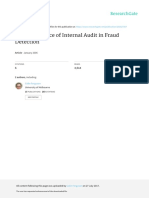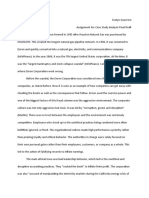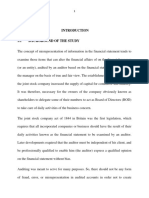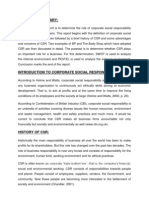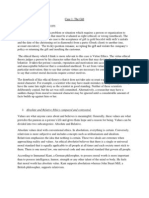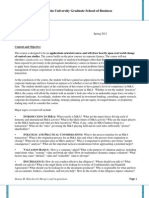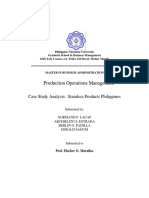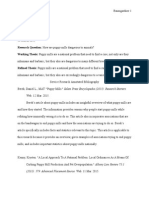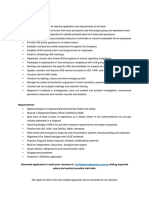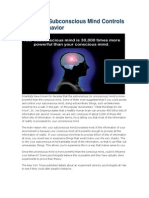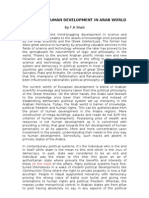Ethics
Ethics
Uploaded by
Dao Xuan Phuong TrangCopyright:
Available Formats
Ethics
Ethics
Uploaded by
Dao Xuan Phuong TrangCopyright
Available Formats
Share this document
Did you find this document useful?
Is this content inappropriate?
Copyright:
Available Formats
Ethics
Ethics
Uploaded by
Dao Xuan Phuong TrangCopyright:
Available Formats
My discussion for the Case1-2 Cruise Ships and the Disposal of Waste at Sea is presented below. 1.
The companies that own the cruise ships can cut the cost of nonhuman waste storage, treatment cost of such waste, space for waste storage, etc. The stakeholders of the company including the shareholders, executives, staff, and so forth will enjoy the benefits of the policy. The customers enjoy relatively inexpensive vacation since they are not charged very high to make up for the waste-dumping costs. People living on the coast of which the sea cruise ships dump waste at are enjoying the trading of souvenirs, gifts, and clothing to tourists. All these people will probably be benefited from the present dump at sea policy. 2. The waste dumped at sea will pollute the sea of the inland nations, causing harm to the sea creatures. Therefore, the residents and fishermen will probably be harmed from continuing the present dump at sea policy. 3. The right of the cruise company doing business without any proof of harm to anybody will be exercise by continuing the present dump at sea policy. The customers right of enjoying economical vacations will also be exercise. 4. The right of the local residents and fishermen of the coastal areas to enjoy the fresh sea and benefit from the healthy sea creatures living in their area is ignored. 5. The method to determine fairness is to consider what would be the balance of right vs. wrong if everyone within the society considered what regulations should be adopted while ignorant of his or her own self-interest (Hosmer, 2008, p.12). In case (1), it is not right that a group of people benefit from a policy that harms other groups of people for a very long time. We know that once the environment is polluted, especially when the sea is polluted, it is very difficult to take the environment back to the original condition. It also take time and money to fight pollution. We also know that the sea pollution can disperse quickly and those who will be harm by such pollution will increase in number. Therefore, the vacation cruise lines should not continue to dump gray water wastes at sea. In case (2), the vacation cruise lines can continue to dump gray water wastes at sea but not within the sea boundaries of the island nations. This is because the cruise ships must respect and obey the law of the island nations once they are in the official areas of such nations. 6. According to Hosmer (2008), the economic outcomes refer to the net balance of benefits over costs for the full society (p. 10). In this case, the economic benefits are the cost saving from redesigning the physical layout of the ships for storing waste, the cost of waste treatment, the cost of saving pace of staff and
customers for waste storage, etc. The customers enjoy the 15% to 20% off the price compared with the price when no more waste is dumped at sea. However, it is necessary to consider the potential cost in terms of pollution treatment and the costs of the consequences imposed on the native peoples of the island nations without their consent. 7. The legal requirements in moral analysis refer to the laws adopted by members of society to regulate the behavior of member of that society (Hosmer, 2008, p. 11). Within the official boundaries of the island nations, which is usually defined as three miles from the nearest point of land, the island nation laws should take precedence. If the ships go beyond the sea of the island nation, the world maritime laws should take precedence. 8. Ethical duties, according to Hosmer (2008), are a method of moral analysis that attempts to provide a set of rules as to what would be in the interest of society under all conditions and/or situations (p. 13). In this case, considering the balance between benefits for some people within the society and harms for other that will result in an overall improvement for the full society, I see the shortterm benefits are large. However, the long-term consequences are also enormous. As I see it, the parties involved in this situation should evaluate the benefits and harms, get a mutual understanding and agree on a solution. The solution might be reducing the percentage of waste dumped at sea or completely stop dumping such waste.
Discuss 2 The situation is very sensitive. There are hundreds of drugs on the market that carry side effects. The side effects of Vioxx showed in at least 18 months taking the drug. This period was long enough for someone to switch to another alternative. It was right for the company to sell the product as it was officially approved by the Food and Drug Administration. It was right for the company to advertise and market its product in the free market. It was right for the company to produce a drug that can help people fight diseases. However, it was wrong of the corporation not to state the truth about the risk associated with the drug. It was wrong to conceal the information about the danger of the drug that directly affects consumers health. Consumers had the right to protect their health. They had the right to acknowledge safety information. Concealing information is also wrong in that it provides Vioxx advantage over its competitive drugs on which safety profile is clearly stated. Thus, such an action does not comply with the standard of fairness.
In this case, the selling of the drug was right, but concealing the information about the safety problems.
You might also like
- Enron - The Crookedest Guys in The RoomDocument20 pagesEnron - The Crookedest Guys in The RoomMargaretta LiangNo ratings yet
- Case 1.4 Sunbeam The Revenue Recognition PrincipleDocument4 pagesCase 1.4 Sunbeam The Revenue Recognition Principlerohanfyaz0075% (4)
- Ethics Enron PDFDocument2 pagesEthics Enron PDFChrisNo ratings yet
- Ethics-Whistle Blowing Info - ShenaeDocument5 pagesEthics-Whistle Blowing Info - ShenaeShenae Adams100% (1)
- Harlan FoundationDocument9 pagesHarlan FoundationNastiti KartikaNo ratings yet
- 10 ReactionDocument6 pages10 ReactionKarl Jason Dolar CominNo ratings yet
- Product Management Report PDFDocument67 pagesProduct Management Report PDFEmma McQuillanNo ratings yet
- A Manual of Equity Jurisprudence - Josiah William SmithDocument577 pagesA Manual of Equity Jurisprudence - Josiah William Smith9Nysut9100% (11)
- Pantaleon V AmexDocument3 pagesPantaleon V AmexJet SiangNo ratings yet
- Unit I The Role of Human Resources and Its Management in An OrganizationDocument5 pagesUnit I The Role of Human Resources and Its Management in An OrganizationRhopeNo ratings yet
- Merck Case Study 1Document15 pagesMerck Case Study 1Rhyan ParkNo ratings yet
- The Importance of Internal Audit in Fraud DetectioDocument31 pagesThe Importance of Internal Audit in Fraud DetectioCharmaine Mapesho CharlotteNo ratings yet
- Assignment 8e - Case Study Analysis Final DraftDocument6 pagesAssignment 8e - Case Study Analysis Final DraftEvelyn GuerreroNo ratings yet
- Hofstede OutputDocument7 pagesHofstede OutputPavan Reddy MareddyNo ratings yet
- Case Study - PNOC EDC (Critique) (Group 5)Document6 pagesCase Study - PNOC EDC (Critique) (Group 5)Anonymous bV4OSINo ratings yet
- Caitlyn Lee - Case Study Assignment - Ogl 345Document11 pagesCaitlyn Lee - Case Study Assignment - Ogl 345api-562162979No ratings yet
- Lessons From Theranos: Changing Narratives of Individual Ethics in Science and EngineeringDocument6 pagesLessons From Theranos: Changing Narratives of Individual Ethics in Science and EngineeringJobayear AhmedNo ratings yet
- Analysis of External Environment of The OrganizationDocument20 pagesAnalysis of External Environment of The OrganizationKing BascosNo ratings yet
- Classification of InsuranceDocument5 pagesClassification of InsurancefarhanmskhanNo ratings yet
- Perfect Competition, Monopoly, Monopolistic and OligopolyDocument42 pagesPerfect Competition, Monopoly, Monopolistic and OligopolyAbhimanyu KotwalNo ratings yet
- Mini-Case Enron's Code of EthicsDocument3 pagesMini-Case Enron's Code of EthicsGarcia, Ralph Gio P.No ratings yet
- Dividend Assignment ReportDocument20 pagesDividend Assignment ReportSadia Afroz LeezaNo ratings yet
- Fraud-Health South CaseDocument4 pagesFraud-Health South CaseKenneth WongNo ratings yet
- Business Law - Case 18 7Document11 pagesBusiness Law - Case 18 7descandantofthesunNo ratings yet
- G7 - Monopoly and Oligopoly Cases PrintDocument11 pagesG7 - Monopoly and Oligopoly Cases PrintboeNo ratings yet
- Business-Ethics-Ppt-Ch5 SlidesDocument16 pagesBusiness-Ethics-Ppt-Ch5 SlidesKaram AlhajNo ratings yet
- Case 1Document2 pagesCase 1Danny CastilloNo ratings yet
- Effect of Misrepresentation of Information in A Financial StatementDocument82 pagesEffect of Misrepresentation of Information in A Financial Statementachiever usangaNo ratings yet
- Lesson No. 13 - Ethics and Social Responsibility in ManagementDocument25 pagesLesson No. 13 - Ethics and Social Responsibility in Managementjun junNo ratings yet
- Board of Directors and ManagementDocument3 pagesBoard of Directors and ManagementVirgie BanclosNo ratings yet
- Government Accounting Assignment - PajarilloDocument3 pagesGovernment Accounting Assignment - PajarilloPhrexilyn PajarilloNo ratings yet
- Mintzberg's 5 P's of StrategyDocument4 pagesMintzberg's 5 P's of Strategygraceh2No ratings yet
- Kasus EnronDocument4 pagesKasus Enronsh573No ratings yet
- PESTELDocument2 pagesPESTELVijay SinghNo ratings yet
- Agency Theory Suggests That The Firm Can Be Viewed As A Nexus of ContractsDocument5 pagesAgency Theory Suggests That The Firm Can Be Viewed As A Nexus of ContractsMilan RathodNo ratings yet
- Corporations: Organization and Capital Stock Transactions: Learning ObjectivesDocument61 pagesCorporations: Organization and Capital Stock Transactions: Learning ObjectivesFria mae100% (1)
- Point of View: Problem Statement: Framework of AnalysisDocument2 pagesPoint of View: Problem Statement: Framework of AnalysisDPS1911No ratings yet
- Chapter 01 - Understanding EthicsDocument24 pagesChapter 01 - Understanding EthicsMERINANo ratings yet
- Corporate Social ResponsibilityDocument9 pagesCorporate Social ResponsibilityNavneet Kaur DhattNo ratings yet
- Chapter 3Document19 pagesChapter 3Amani Saeed100% (1)
- Business Ethics AssignmentDocument11 pagesBusiness Ethics AssignmentAshvind DookheeNo ratings yet
- BBA VI Semester: Business and SocietyDocument17 pagesBBA VI Semester: Business and SocietyBCom HonsNo ratings yet
- 6th Report DRAFT 2020Document82 pages6th Report DRAFT 2020ronaldNo ratings yet
- The Importance of Porters Five ForcesDocument2 pagesThe Importance of Porters Five ForcesDurga 94No ratings yet
- 07 - Positive Accounting TheoryDocument15 pages07 - Positive Accounting TheoryAizzad LoqmanNo ratings yet
- Workingcapitalmanagement-Lecture (Student)Document19 pagesWorkingcapitalmanagement-Lecture (Student)Christoper SalvinoNo ratings yet
- Article On Business EthicsDocument14 pagesArticle On Business EthicsValeriano KatayaNo ratings yet
- Maasai Mara University School of Business and EconomicsDocument12 pagesMaasai Mara University School of Business and Economicsjohn wambuaNo ratings yet
- Literature Review - EthicsDocument5 pagesLiterature Review - EthicsMadhushiWijeratna0% (1)
- How Does PC Impact On Firm PDFDocument3 pagesHow Does PC Impact On Firm PDFRabia NajafNo ratings yet
- Organizational BehaviourDocument43 pagesOrganizational BehaviourAndree JaiswalNo ratings yet
- Figure Eight Island Homeowners' Association, Inc. Case StudyDocument16 pagesFigure Eight Island Homeowners' Association, Inc. Case StudyYoong YingNo ratings yet
- Best Buy Case StudyDocument7 pagesBest Buy Case StudyDeyanelys NavarroNo ratings yet
- Becg Unit-5Document9 pagesBecg Unit-5Bhaskaran Balamurali100% (1)
- Business EthicsDocument16 pagesBusiness EthicsOjie DeanNo ratings yet
- BGS ModelsDocument24 pagesBGS Modelsprasannamurthy100% (1)
- Mergers & AcquisitionsDocument4 pagesMergers & AcquisitionsdikpalakNo ratings yet
- Case Stainless Steel - Group CaseDocument9 pagesCase Stainless Steel - Group CaseBerlin PadillaNo ratings yet
- Expectancy Theory SummaryDocument10 pagesExpectancy Theory Summaryapi-356010890No ratings yet
- Corporate Social ResponsibilitiesDocument22 pagesCorporate Social ResponsibilitiesAbhijay GoyalNo ratings yet
- Property, Plant and Equipment: By:-Yohannes Negatu (Acca, Dipifr)Document37 pagesProperty, Plant and Equipment: By:-Yohannes Negatu (Acca, Dipifr)Eshetie Mekonene AmareNo ratings yet
- Compelling Returns: A Practical Guide to Socially Responsible InvestingFrom EverandCompelling Returns: A Practical Guide to Socially Responsible InvestingNo ratings yet
- RPC CodalDocument44 pagesRPC CodalJessica Bernardo100% (1)
- Philosophy of AmbedkarDocument21 pagesPhilosophy of AmbedkarmuanNo ratings yet
- Annotatedbib2 DebockDocument2 pagesAnnotatedbib2 Debockapi-282281003No ratings yet
- Safety OfficerDocument1 pageSafety Officerjacobpm2010No ratings yet
- Presentation (Atif, Bilal)Document19 pagesPresentation (Atif, Bilal)Junaid FarooqNo ratings yet
- The Philosophy of Management: Philosophy As A Challenge To Business, Management As A Challenge To PhilosophyDocument2 pagesThe Philosophy of Management: Philosophy As A Challenge To Business, Management As A Challenge To PhilosophyCherylNo ratings yet
- Natino vs. IACDocument6 pagesNatino vs. IACAnonymous 33LIOv6L100% (1)
- 1 Professional and Ethical BehaviorDocument3 pages1 Professional and Ethical Behaviorapi-284871236No ratings yet
- MpuDocument4 pagesMpuLawrence LingNo ratings yet
- Definition of Eductaion Unit 1.1 F.edDocument16 pagesDefinition of Eductaion Unit 1.1 F.edArshad Baig MughalNo ratings yet
- How Your Subconscious Mind Controls Your BehaviorDocument2 pagesHow Your Subconscious Mind Controls Your Behaviorlalek00100% (2)
- Ethics, Morality & Concept-Unit 1Document12 pagesEthics, Morality & Concept-Unit 1Gaurav Kumar singhNo ratings yet
- The Single Story of Africa: Yesha Bhojak Grade 9A Language and Literature Image of Africa, Persuasive EssayDocument5 pagesThe Single Story of Africa: Yesha Bhojak Grade 9A Language and Literature Image of Africa, Persuasive Essayunknownn7372No ratings yet
- Navigator Tutorials: Business Ethics Question BankDocument4 pagesNavigator Tutorials: Business Ethics Question BankManish FloraNo ratings yet
- Barbara Lim Cheng Sim V Uptown Alliance (M)Document33 pagesBarbara Lim Cheng Sim V Uptown Alliance (M)Zaki ShukorNo ratings yet
- Human Challanges in Arab WorldsDocument3 pagesHuman Challanges in Arab WorldsTHSHAHNo ratings yet
- Hernandez V HernandezDocument2 pagesHernandez V Hernandeznadgb100% (1)
- Operation Sooner or Later Summery SheetDocument2 pagesOperation Sooner or Later Summery SheetwtlvwjxxNo ratings yet
- The Story of JoyDocument15 pagesThe Story of JoyMohamadNo ratings yet
- Bonifacio Vs RTC Full TextDocument11 pagesBonifacio Vs RTC Full TextlacbayenNo ratings yet
- The Drugs Act 1976 PDFDocument37 pagesThe Drugs Act 1976 PDFZirwa AsimNo ratings yet
- Picture DescriptionDocument16 pagesPicture DescriptionRajja Rashad100% (1)
- Maternity Benefit Act 1961Document13 pagesMaternity Benefit Act 1961Rohit MandyalNo ratings yet
- Terorisme Anak Univ AirlanggaDocument18 pagesTerorisme Anak Univ AirlanggaArch AchnologiaNo ratings yet
- 11 People V WagasDocument4 pages11 People V WagasRonnieNo ratings yet
- Tmail 9247 - A Enhanced Handpieces For LightSheer Duet and DesireDocument1 pageTmail 9247 - A Enhanced Handpieces For LightSheer Duet and DesireZeljko TomicNo ratings yet
- Course Description: Iss 611E - Selected Topics Entrepreneurship Course Outline Ver. 1.1 - 22.09.2019Document15 pagesCourse Description: Iss 611E - Selected Topics Entrepreneurship Course Outline Ver. 1.1 - 22.09.2019Hatice TurhanNo ratings yet
- Prohibited Activities During A Strike or LockoutDocument1 pageProhibited Activities During A Strike or LockoutCarty MarianoNo ratings yet











